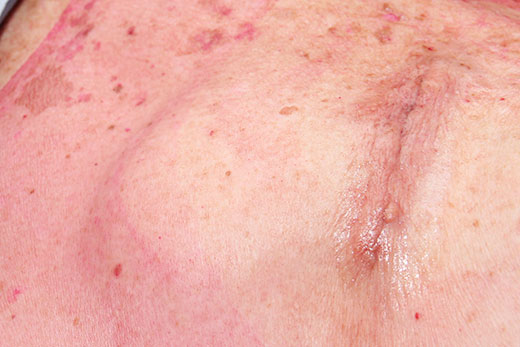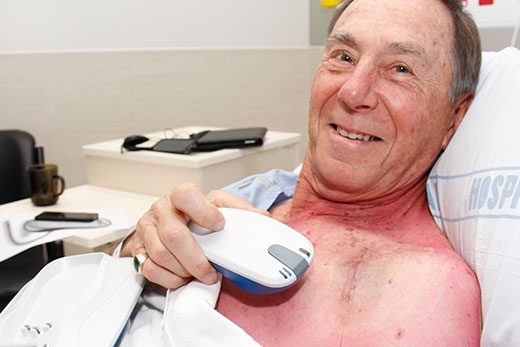Tauranga man Bruce Partridge is the first NZ patient to have a device preventing sudden cardiac arrest implanted in his collarbone, which can also withstand MRI scans.
As the first NZ facility to implant the breakthrough technology, Tauranga Hospital staff performed the small operation to insert Medtronic Evera MRI system this morning.
Bruce Partridge, in his Tauranga Hospital bed today, after the first NZ device that can help prevent sudden cardiac arrest but also withstand MRI scans was inserted near his collarbone.

The 65-year-old Otumoetai resident is glad to have the measure – with it being the first to device to detect and treat dangerously high heart rates, known as tachycardia, while also allowing full‐body MRI scanning under certain conditions.
Until today, Implantable Cardioverter Defibrillators, known as ICDs, have played the important role in preventing SCA but are unable to receive full-body MRI scans due to potential interactions between the two devices.
Instead patients have had to rely on CT scans or X‐rays, which can fail to detect the same level of detail for conditions, including tumours, muscle damage, and other internal injuries.
Bruce says doctors believe his heart is damaged from receiving chemotherapy, which was given to cure lymphoma (cancer of the lymph nodes) he suffered 12 years ago.
'So I had some testing recently, last year, and the suggestion from the cardiologist was an ICD device would be of value to protect against sudden cardiac arrest,” says Bruce.
'I thought I was coming in today to get an ICD – I didn't realise I'd be the first to get a device capable of being used with an MRI scanning system.
'The ICDs can't go through an MRI scanner – they can't do as detailed checking – but the MRI is a more sophisticated checking system than say X-rays and CT scans.”
Asked how he feels about having NZ's first Medtronic Evera MRI system implanted, Bruce says he just feels glad to have the technology.
'It's just quite exciting to be part of it,” says Bruce, who went to Tauranga Hospital for a day appointment and one hour later had the new technology.
'It's inserted just under my collarbone on the left hand shoulder and just sits under the skin like a little bump; it sort of protrudes a bit on your flesh, but yeah.”
An estimated 4000 New Zealanders each year experience SCA and only eight per cent – about 320 people – survive the event.
Defibrillation is the only definitive treatment for SCA, and survival decreases seven‐10 per cent for every minute without it.
SCA can affect anyone, but detection is possible through appropriate screening including long‐term cardiac monitoring.
Tauranga Hospital electrical cardiologist Dr Dean Boddington inserted the Medtronic Evera MRI system implant into three patients today.
'The new part about is it can go in an MRI,” says Dean.
'We've been putting in ICDs for about six years and what's new about this device is prior to this if you had an ICD put in you wouldn't be able to go in an MRI Scanner, which is obviously limiting for patients because they get excluded from things if they need a scan.”
Dean says some patients will find the new device very useful for MRI scans.
'Two of three patients we put them in today might well need MRI scanning in the future; sometimes they need scanning to look further at their heart and cardiovascular system to exactly what the cause is of why they had their problems in the first place – and other patients you can anticipate they need scan if they have other problems,” says Dean.
'It [an MRI scan] can be for both cardiology reasons and other reasons as well.”
As many as 63 per cent of ICD patients are estimated to need an MRI within 10 years of receiving a device.
Asked whether he feels more protected with Medtronic Evera MRI system implant, Bruce says: 'I guess it gives you some confidence that reduced risk to some degree”.



0 comments
Leave a Comment
You must be logged in to make a comment.